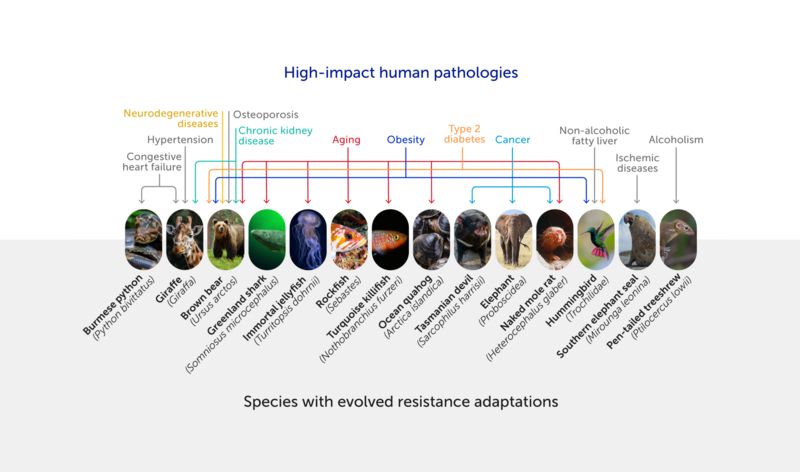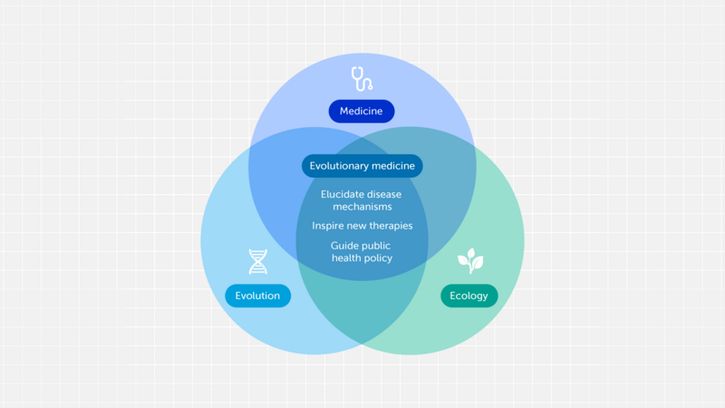
Frontiers in Science Lead Article
Published on 28 Feb 2023
The future of evolutionary medicine: sparking innovation in biomedicine and public health
- 84,021 views
- 39 citations


Frontiers in Science Lead Article
Published on 28 Feb 2023

At a Frontiers Forum Deep Dive session on 21 September 2023, Dr Barbara Natterson-Horowitz, Prof Daniel Blumstein and other renowned researchers delved into the potential of evolutionary medicine to transform biomedicine and public health.

Prof Mark Hanson, expert on developmental pathways to disease at the University of Southampton, comments on evolutionary medicine’s potential to offer biomedical innovation and suggests directions in which the field should evolve to meet contemporary challenges.

Evolutionary biologist Prof Bernard Crespi, from Simon Fraser University, outlines the three divides that evolutionary medicine must span – from academic theory to medical research to clinical application – to successfully integrate into mainstream medicine and impact human health.

Population biologist Prof Michael Hochberg, from the Institute of Evolutionary Science of Montpellier, discusses key challenges for evolutionary medicine – such as integrating complexity, engaging medical and policy stakeholders, and applying biomimetics – and priority actions to address these.

Prof Rees Kassen, evolutionary biologist at the University of Ottawa and working at the interface between science, society, and policy, considers how evolutionary medicine can overcome a conservative research ecosystem – and so enter into standard healthcare practices and policy development.

Dr Barbara Natterson-Horowitz of the University of California, Los Angeles (UCLA) and Harvard University and Prof Daniel Blumstein of UCLA discuss what drew them to an evolutionary perspective on medicine, how we can resolve a mismatch between our genes and environment, and more.
Evolutionary medicine can apply insights from evolution and ecology to spark transformational innovation in biomedicine and inform effective health policies.
Systematic mapping is required to identify animal model systems for disease vulnerability, resistance, and counter-resistance that could lead to novel clinical treatments.
Evolutionary dynamics should also guide the development of novel therapeutic approaches that target the development of treatment resistance in cancers and antimicrobial resistance.
Many modern human diseases result from mismatches between the ecologies in which we evolved and our modern environments, while others reflect life-history evolution – these insights have important implications for public health policies and disease-prevention efforts.
Effective management of the COVID-19 (SARS-CoV-2) pandemic and future zoonotic outbreaks requires applying evolutionary theories to understand and model infection dynamics and create models of future scenarios.
Evolutionary principles can also be used to understand and address aspects of human behavior that impede biomedical innovation and public health, such as vaccine hesitancy.

A summary of the lead article in a Q&A format, with infographics and a video.

A version of the lead article written for – and peer reviewed by – kids aged 8-15 years.

Scientists release a research plan for innovative biomedical therapies and public health measures based on evolutionary principles – which could help tackle antibiotic resistance, cancer, obesity, and more.

Researchers from the University of California, Los Angeles say the approach could help tackle cancer, antibiotic resistance, food-related disorders.

Evolution might be the last thing on your mind when going to see a physician, but evolutionary processes impact our health every day.

Evolutionary medicine is an emerging interdisciplinary field with huge potential to improve human health and tackle a broad scope of major health challenges.

The relatively new discipline of evolutionary medicine is making strides in the fields of cancer treatment and antibacterial resistance.
Follow the science, follow Frontiers in Science